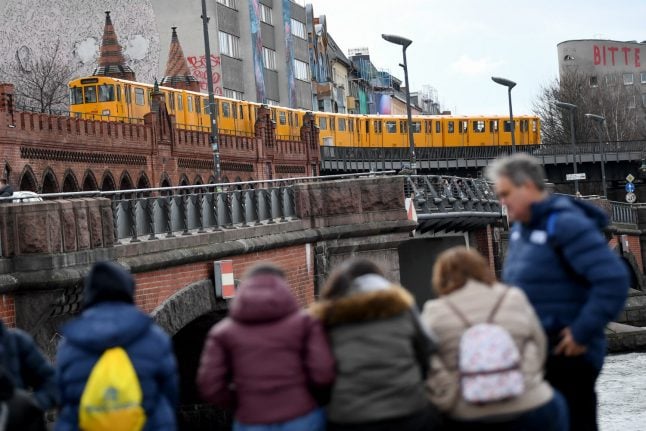Passengers who use buses, underground trains (U-Bahn) and trams will be affected in the third – and toughest yet – so-called ‘warning strike’ by 'Berliner Verkehrsbetriebe' (BVG) staff who are also union members.
The Verdi trade union called on its members to down their tools and walk out as part of the action which is due to start in the early morning of April 1st and last the whole day.
SEE ALSO: IN PICTURES: Berlin public transport strike ends but more disruption expected
BVG is Germany's largest local public transport company and, with more than 2.9 million customer trips per day, it's the backbone of the capital’s local public transport system.
The S-Bahn lines are not directly affected because these trains belong to the operator Deutsche Bahn. Regional trains are also not operated by BVG, so passengers can switch to these means of transport.
S-Bahn services and regional trains are, however, expected to be over-crowded as people flock to them during the strike.
SEE ALSO: Passengers face disruption as bus drivers in Berlin set to strike
During the BVG strike which took place on Friday, February 15th, the majority of U-Bahn, tram and bus services were halted from early morning until 12noon. Traffic slowly resumed to normal afterwards. Further action took place on March 14th as bus drivers in the capital went on strike.
During Monday's planned strike it is likely that bus services to Tegel Airport in the north of the city will not be in operation. In the last two strikes, Berlin Airport Services confirmed they would provide a shuttle bus from Jakob-Kaiser-Platz U-Bahn station.
There were also some services that continued during the last strikes because they are run by contractors of BVG. The bus lines which remained in operation during previous actions were: 106, 161, 162, 163, 168, 175, 179, 218, 234, 263, 275, 284, 320, 322, 334, 341, 349, 363, 365, 371, 373, 380, 390 and 399.
More information will likely become available on Monday morning.
Verdi rejected latest offer
The action is taking place as negotiations over pay and conditions for around 14,600 employees of BVG and its subsidiary Berlin Transport (BT) continue.
Verdi rejected the latest offer from the employers on Thursday.
“An agreement in the collective bargaining conflict was not possible due to the offer submitted by the employer,” said Jeremy Arndt, Verdi negotiator. “Unfortunately, not all workers are benefiting from the increases the employers proposed.”
Among other things, Verdi wants to implement a 36.5-hour working week with full wage compensation. At present, almost half of the employees hired since 2005 have to work 39 hours.
The strikes have been described by those representing the employers as “completely inappropriate”.
The latest strike comes during a wave of industrial action sparked by separate disputes that's resulted in office and school closures around the country as well as flights being grounded.
SEE ALSO: Public service strikes continue as Potsdam talks fail



 Please whitelist us to continue reading.
Please whitelist us to continue reading.
Member comments